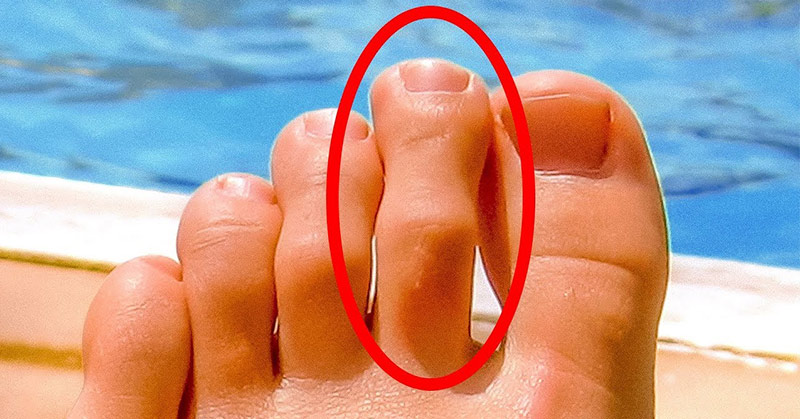We may never understand it all, but our bodies have been perfectly and intricately designed. In fact, it even seems to talk to us sometimes – that is, if we choose to listen. For example, our body has mechanisms to warn us when we’re falling ill such as the tickle in your throat or that subtle chill that sends shivers through your body. However, oftentimes these signs can be vague and it can be difficult to figure out the root cause. Read on for a list of the most common symptoms that can leave us perplexed, and the most likely root causes. Chances are if you address these root causes the symptoms should resolve; if not it may be time to see your healthcare practitioner. Here are 9 Body Signals You Probably Should Not Ignore
1. Leg Cramps
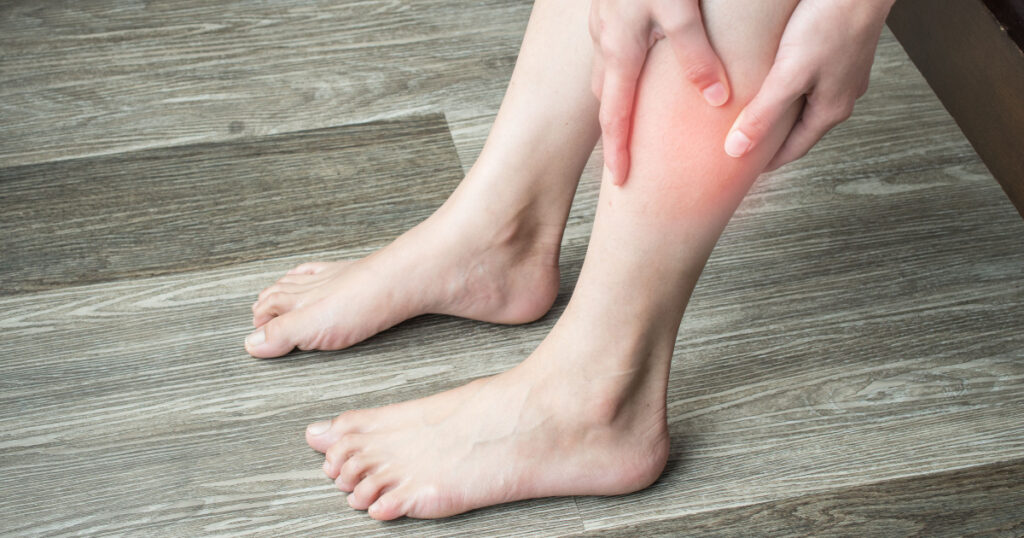
Have you ever woken up to an agonizing leg cramp? The sudden, sharp, lasting pain is the worst. Muscle cramps usually disappear on their own which is great. But there are steps you can take to prevent them from happening as often (or at all).[1]
Read More: 11 Signs You’re Not Getting Enough Magnesium and 20 Foods to Fix It
Causes
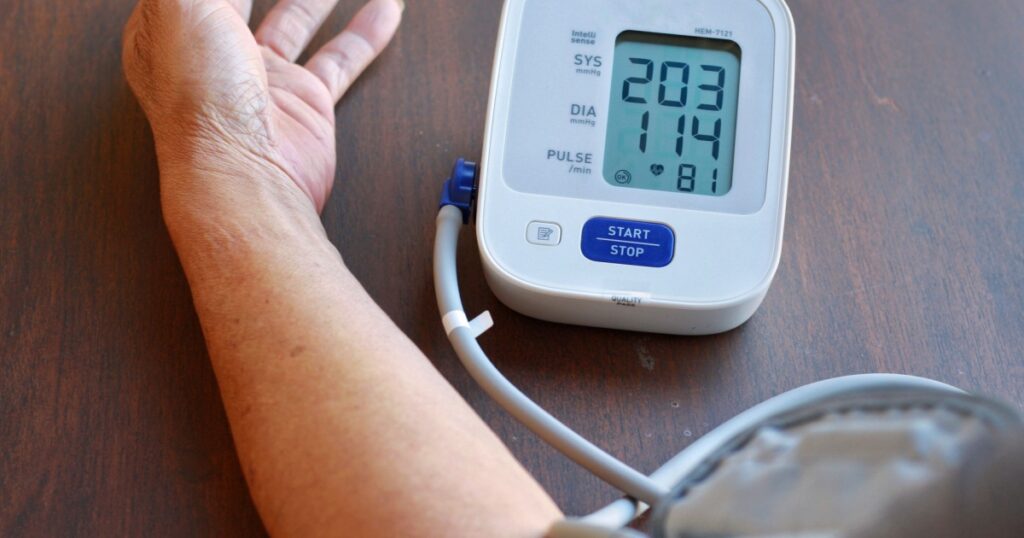
- Inadequate blood supply can occur because of a narrowing of the arteries. People often feel cramp-like pain in their legs during workouts, but it tends to go away after exercising.
- Compression of the nerves in your spine can produce leg cramps, especially if you’ve been walking for a long time.
- Mineral depletion is the most likely cause of your leg cramps and blood pressure medications like diuretics aren’t helping. Minerals such as potassium, calcium, and magnesium are key for reducing leg cramps.
Solutions
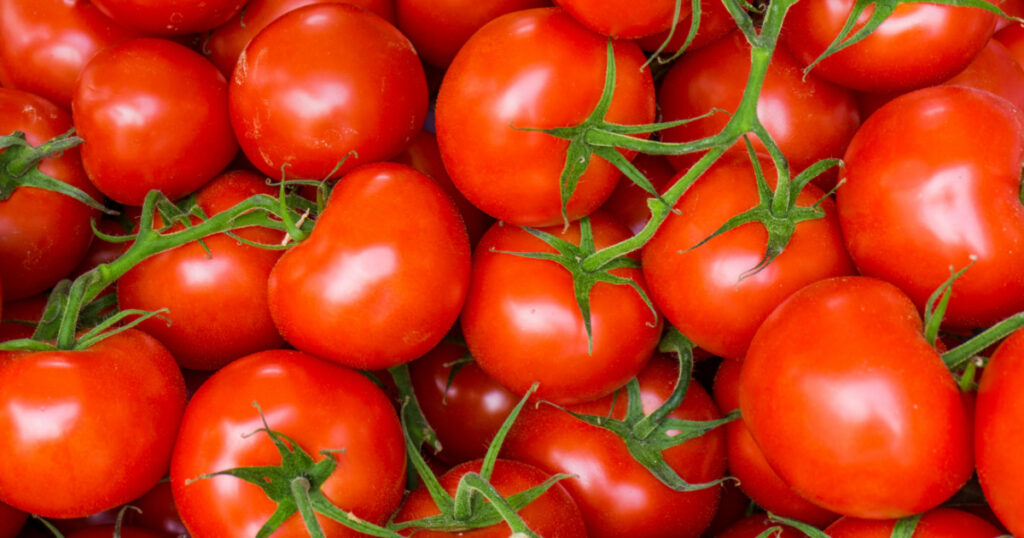
Leg cramps can be hard to fully address because so much contributes to them, but following these steps should help. Help ensure better blood supply by doing gentle yoga and 6 other methods. To improve your spinal health, try to avoid making these subtle spine-damaging mistakes. Eating more potassium-rich foods such as tomatoes, oranges, bananas, and spinach. But when those fail to help, you can also drink a large glass of water, eat half a banana before bed, or drink liquid magnesium glycinate (just talk to your medical practitioner first about correct dosage).
2. Food cravings

We’ve all had those food cravings that can’t be denied. It’s hard, no doubt. But paying attention to other areas of your lifestyle and diet may solve the craving problem for you![2,3]
Causes
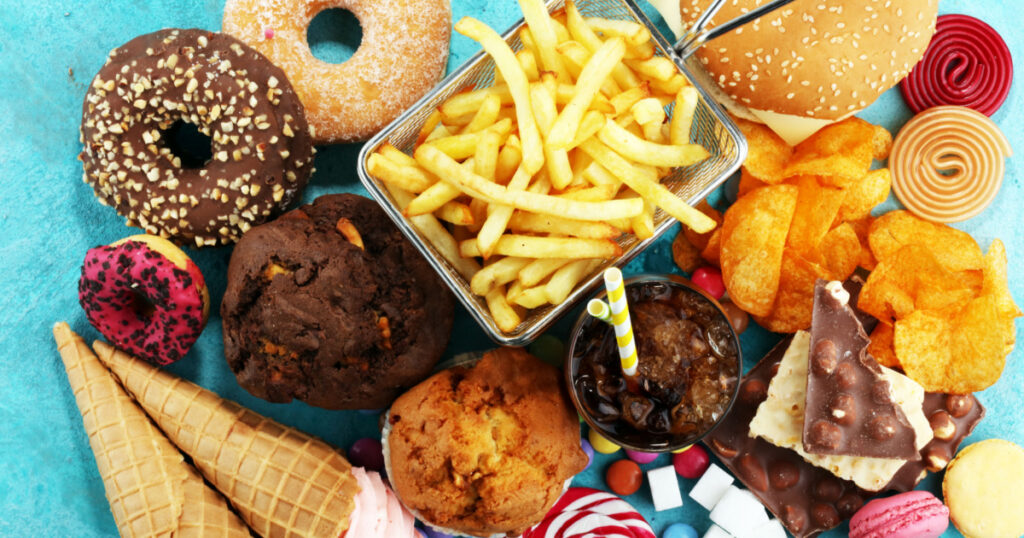
- Over the years, people have trained their brains when it comes to the sweet or salty foods everyone craves. Our brains have come to expect the pleasure and reward felt from eating our guilty pleasures; it’s not easy but breaking the cycle of junk food here is key in order to rewire the brain.
- Hormone imbalances such as adrenal fatigue or too little leptin can often cause food cravings.
- People also crave certain foods because they’re lacking certain essential nutrients. For example, omega-3 deficiency has been known to trigger cheese cravings.[11] And we all know, too much cheese can’t be good. Or, if you notice more intense sweet cravings, your body could be asking for glucose.
Read More: 10 Signs You’re Eating Too Much Sugar
Solutions

It will be tough, but not buying processed foods and other packaged, sweet and salty snacks will make a huge difference. Your leptin and ghrelin levels help you regulate your appetite, but they work best when you get enough good sleep so try to lose the late nights. Less sleep often means more stress, which can lead to more sweet and salty cravings. You can also make an appointment with your doctor to check for nutritional deficiencies or see if you have adrenal fatigue by asking yourself if you have these symptoms.
3. Dry Skin
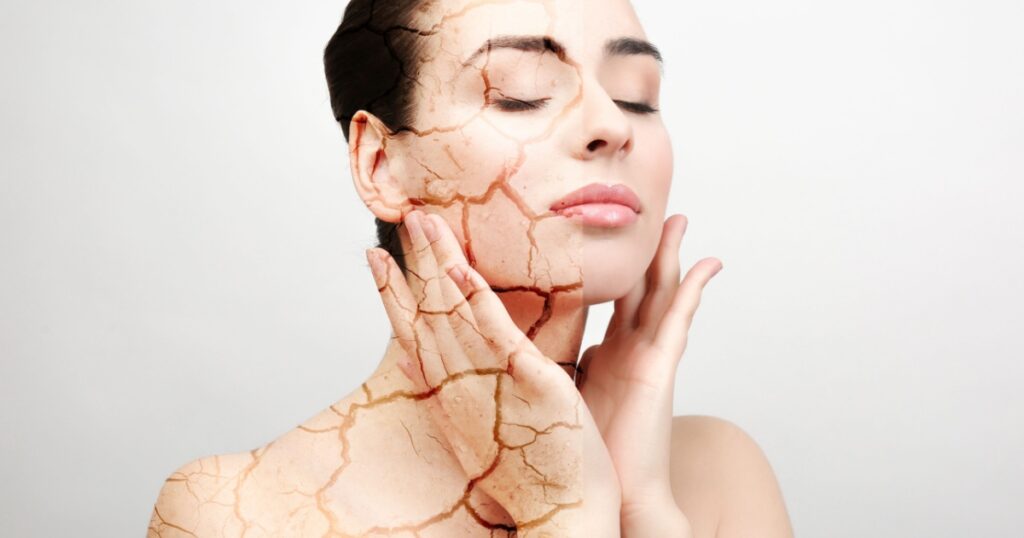
You’d be surprised at how many people have come to accept dry, taut, or ashy skin. However, it could be trying to tell you more.
Causes
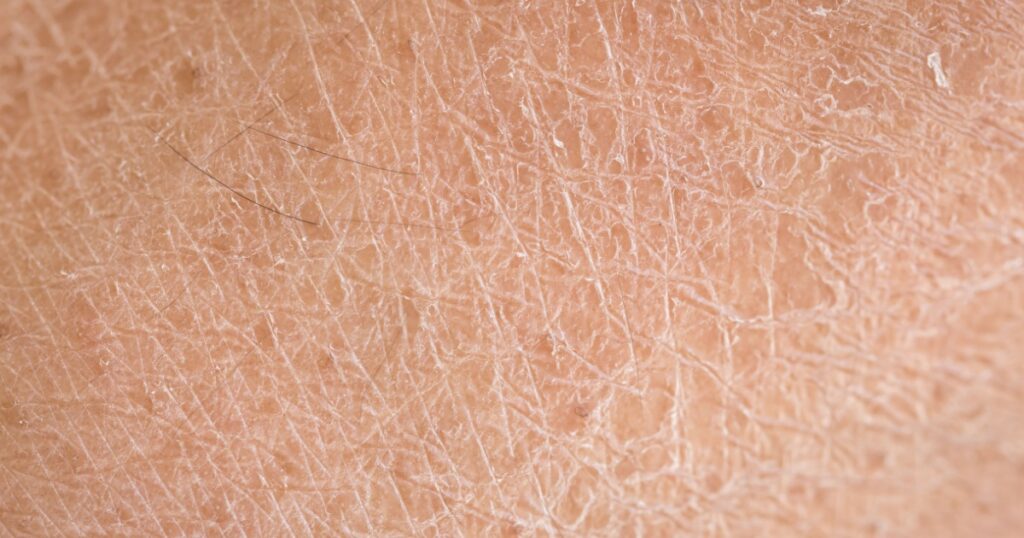
- It sounds redundant, but dry skin can occur as a result of dry weather. In North America, for example, this time happens to be in the dead of winter. On the opposite end of the spectrum, dry heat provided by desert-like areas or even wood-burning stoves or space heaters can also lead to dry skin.
- Hot baths and showers are linked to dry skin. While it’s soothing and relaxing, the heat does take a toll, especially if your skin is sensitive. Speaking of water, heavily chlorinated pools also have a negative, drying effect on skin, so moisturizing right after a swim or shower is key to maintain healthy skin.
- Many soaps and detergents can be harsh on any skin type. Because they’re designed to remove oils (natural or otherwise), your skin is left feeling dry. But dosing up on vitamin E or foods like vegetables, nuts, oil, and fish can be a great help to restore dehydrated skin.
Solutions
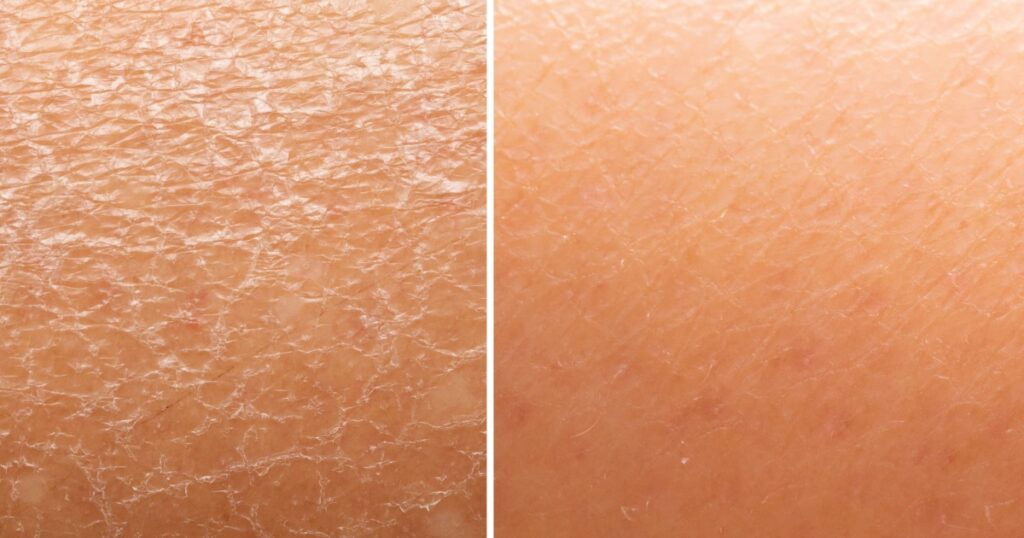
Soothing dry skin has never sounded so delicious. The more good fats you get into your diet, the smoother and more moisturized your skin will be. This means eating more avocados, fatty fish, nuts, seeds, and olive oil. If you don’t want to eat away the dry skin, you can take cooler showers and limit the number of times a day you wash your face to one. Oh, and find a mild soap or serum and oil to wash your face instead.
4. Headaches
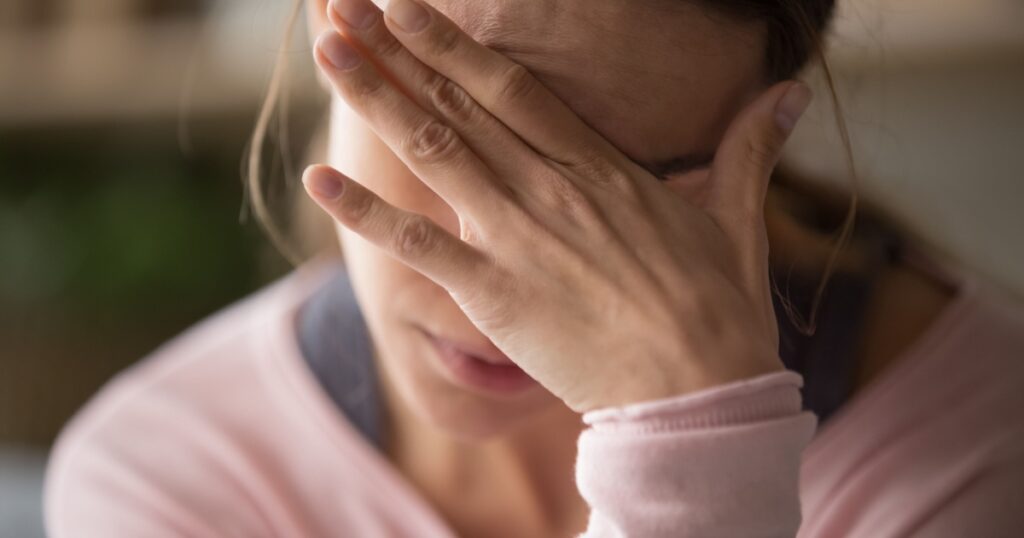
Millions of people suffer from headaches every day and, more often than not, they can be simply solved by hydrating yourself. Now, there are many types of headaches, but these are the most common causes.[4]
Causes

- Having an infection, cold, or fever usually results in headaches due to the pressure of congestion and inflamed sinuses.
- Emotional stress is linked to things such as depression, poor slees, overmedication, and skipping meals tend to add up and can take a huge, unhealthy toll on your brain.
- Your environment greatly affects your well-being. This may include things like second-hand smoke, strong fragrances, and specific foods.
Solutions

Avoiding environmental exposure is the toughest solution, so we’ll get it out of the way first. It’s tough because no one has control over what other people do. Think of, for example, cigarette smoke or strong perfumes. It’s not as easy as simply avoiding them, but everyone does their best. Keeping a food diary can help you track what foods result in headaches, e.g., foods like wheat, dairy, or sugar. Boosting your immunity with these natural antibiotics and magnesium-rich foods can also help reduce headaches. Getting enough sleep and staying hydrated throughout the day will also help keep headaches at bay.
5. Brittle Nails
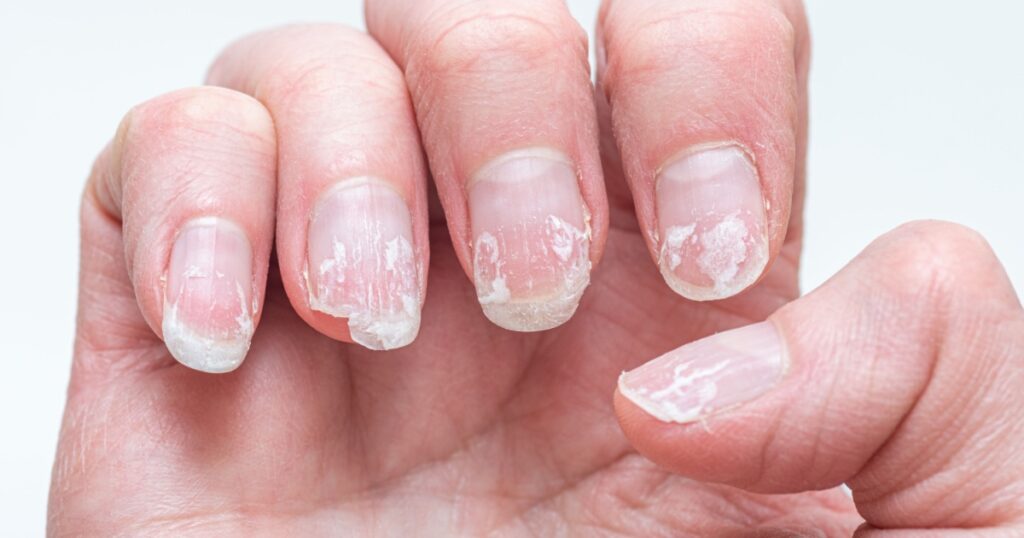
Nails can get more brittle with age and most often occurs in women. But age isn’t the only cause.[5,6]
Causes
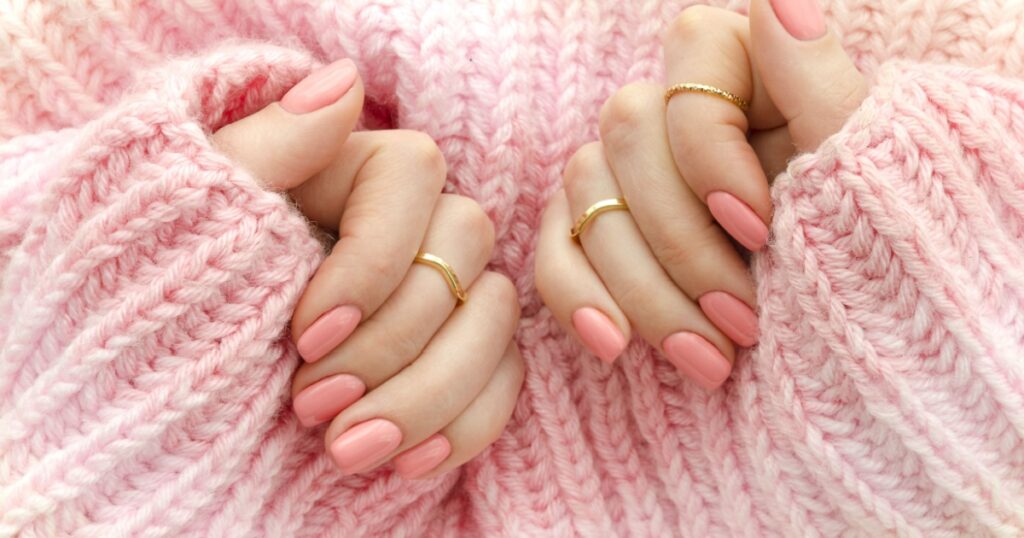
- Long-term nail polish use, no thanks to all the chemicals, can damage your nails. So, if you can help it, try going without it or finding an organic, chemical-free product.
- A hormone imbalance can result in a long list of things: depression, muscle or joint pain, obesity, increased cravings, and… brittle nails. But restoring balance helps make your nails stronger and healthier.
- Eating a poor diet isn’t helping brittle nails either. But vitamins and minerals such as zinc, iron, and vitamins B and C can help restore healthy nails.
Solution

Balancing hormones is almost impossible to do on your own, so it’s best to go on this journey with a health practitioner. They’ll be able to find specifically what nutrients, vitamins, minerals, and foods your body is lacking, as well as set you up with a diet that will help get you there. Frequently using nail polish or going for manicures can weaken your nails, too.
Read More: 7 Signs of Low Self-Confidence and How to Fix It
6. Split Ends
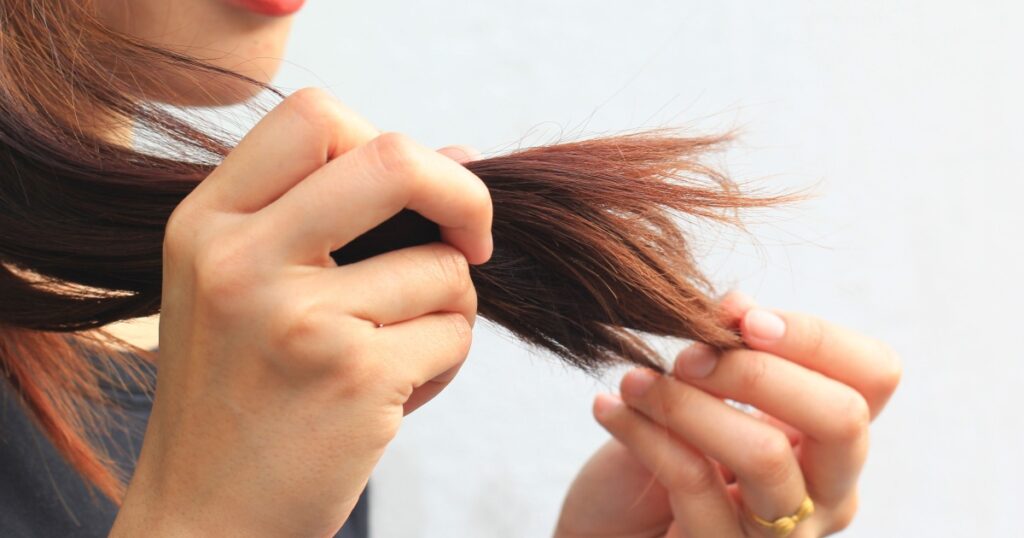
Men may not care as much, but a head full of split ends is a nuisance. Unless you’re looking close, however, split ends are almost invisible. But it’s not so much how they look and rather what they mean for your health.[7]
Causes

- Using heated appliances like blow-dryers or hair straighteners can dry out your hair. Excessive and aggressive brushing can also wear your ends out.
- Using chemical-filled hair dyes is known to look great but at a cost – it leaves your hair dry and brittle like hay. So, if you can, try opting for natural coloring alternatives.
- Most importantly (and least aesthetically), a lack of healthy fats in your diet could be responsible for your split ends. Over time, adding healthy fish or olive oils to your diet can help promote stronger, healthier hair.
Solutions
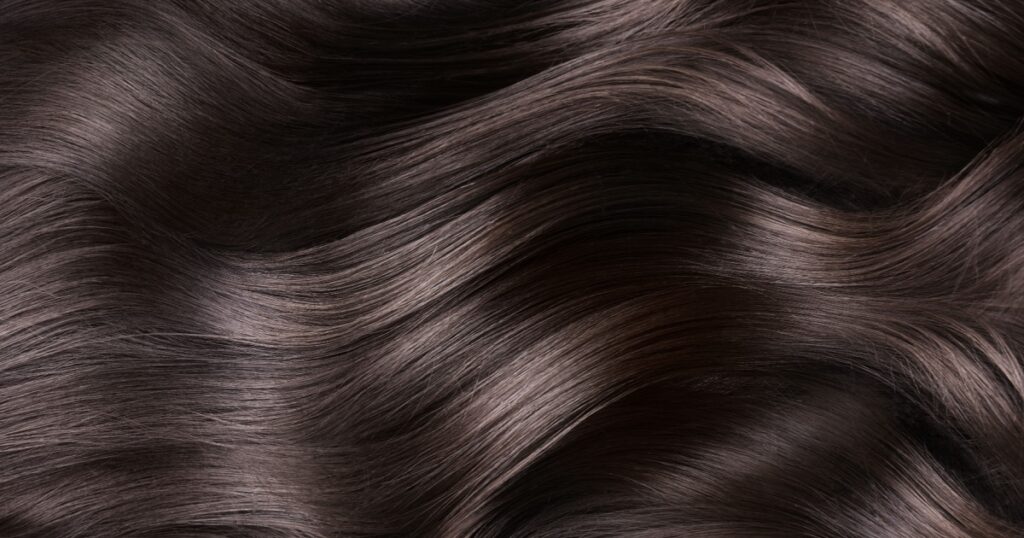
If you dye your hair, the harsh coloring chemicals dry your hair right out. So the next time it’s time for some color, try some natural hair color such as henna or use protective sprays if you are going to use potentially damaging hair products. Instead of using blow-dryers, allow yourself some extra time for your hair to dry naturally as much as you can to avoid the direct heat that can damage your ends. Lastly, eat a more protein-rich diet. The collagen in your body helps produce your hair, which protein is key in creating.
7. Bad Breath
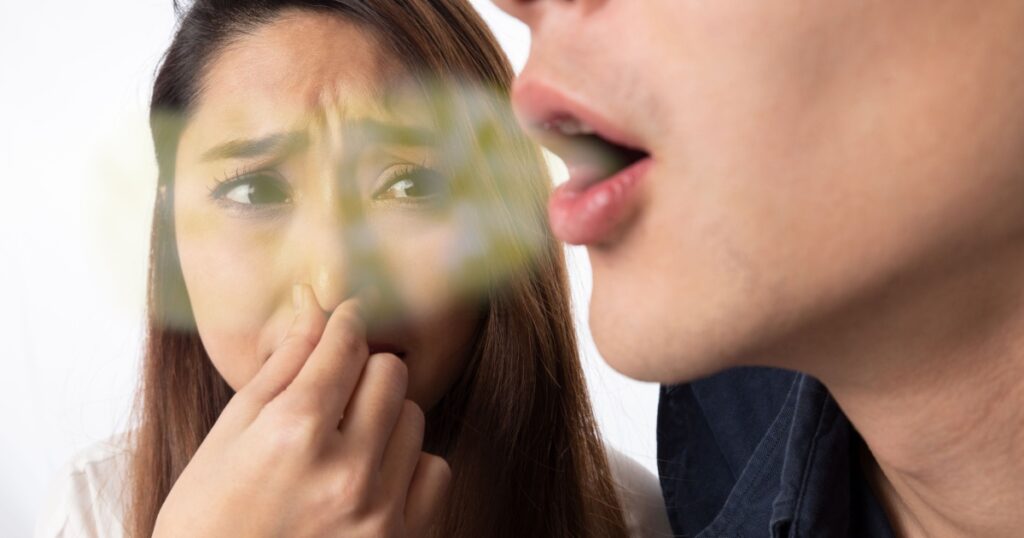
We’ve all experienced it – the self-conscious feeling of being in a face-to-face conversation when you have bad breath. There are so many factors that can lead to bad breath, but these are the most common.[8]
Causes
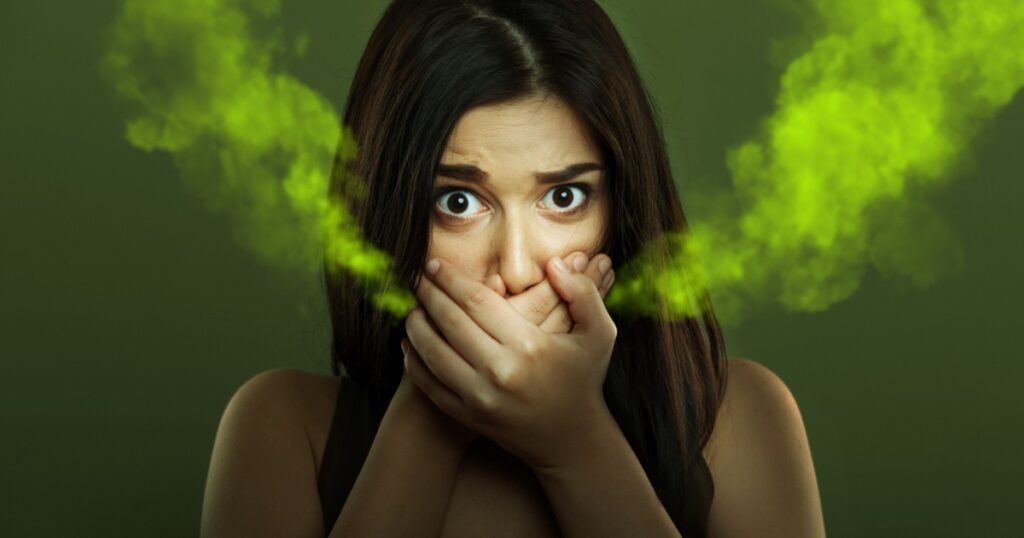
- The food you regularly eat affects your entire body. Depending on the type of food you eat and how great (or not) your oral hygiene is, broken down food particles can begin to rot between your teeth and in pockets of your gums.
- Having a dry mouth can cause bad breath. Without saliva, the body’s natural cleanser, there’s nothing in your mouth to remove particles in your mouth that cause rancid odors.
- Oral infections are important to keep an eye out for, because they can affect other parts of your body such as your gut. Whether it’s gum disease or tooth decay, regular flossing, gargling with salt, brushing, and additional alternatives like oil pulling go a long way to prevent these infections.
Solutions
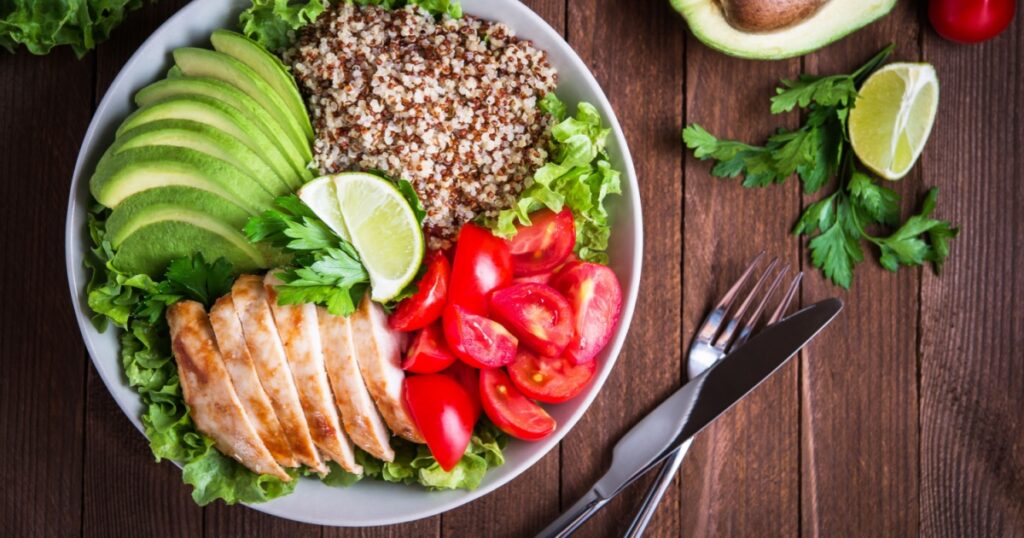
The food you put in your tummy affects what comes out and that includes your breath. Eating more real foods and less processed foods is the first place you should start. This includes boosting your microbiome with pro and prebiotics. Lastly, just like you probably tell your own children, grandchildren, nephews and nieces, use good dental hygiene practices: tongue scraping, brushing, flossing, gargling with salt, and oil pulling.
8. Bloating
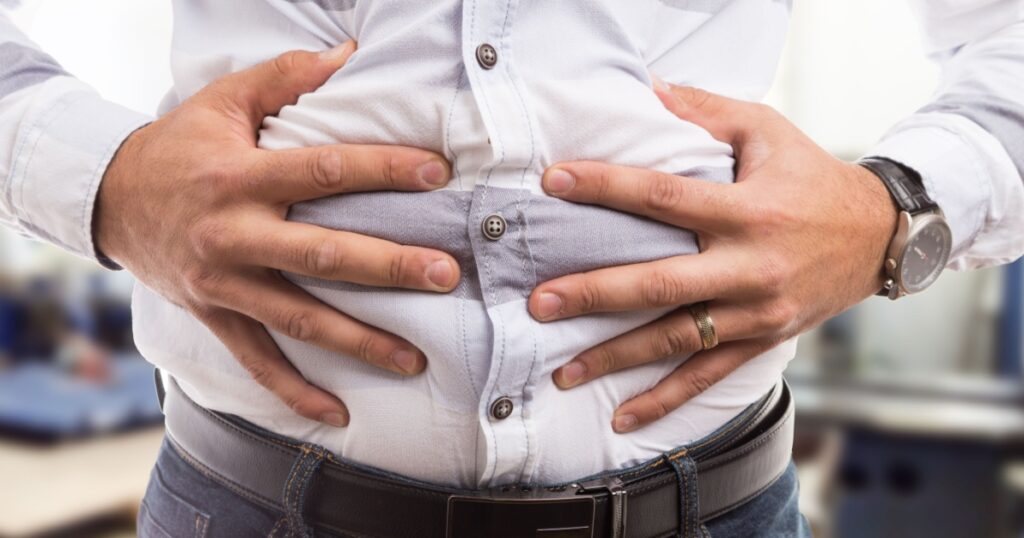
Bloating and feeling gassy after overeating at Thanksgiving lunch or Christmas dinner is one thing, but always feeling that discomfort isn’t a good sign.[9]
Causes
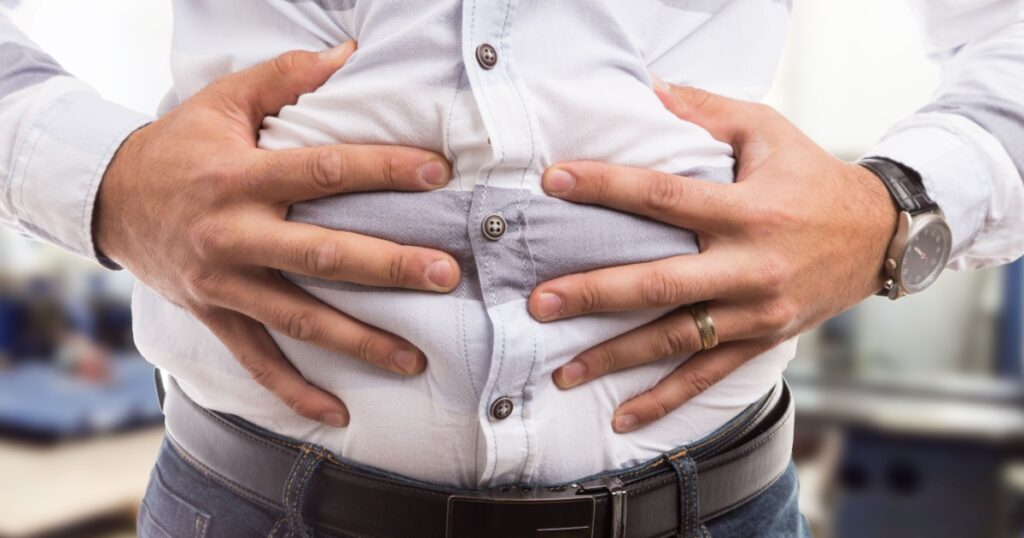
- Eating too fast can result in bloating after you finish a meal. Good thing is, it can be easily avoided if you simply eat slower.
- A diet full of rich and fatty foods can also lead to bloating because they take longer to digest than protein or carbs. As a result, you feel (probably uncomfortably) fuller for longer. The best thing you could do is limit the amount of rich, fatty foods on a weekly basis.
- You may also have a food sensitivity that causes your stomach to bloat up every time you eat it. If you aren’t sure what’s causing it, try something like an elimination diet.
- Stomach acid is the starting point of digestion in the gut; if you have low stomach acid this results in improper breakdown of food in the stomach and eventually fermentation, off-gassing and symptoms of acid reflux. You may also feel tired, heavy and sluggish after meals if you have low stomach acid.
- If there is an overgrowth of bacteria in your small intestine (known as SIBO) this can result in chronic bloating; essentially there is too much bad bacteria overpowering the good gut bacteria in your gut
Solutions
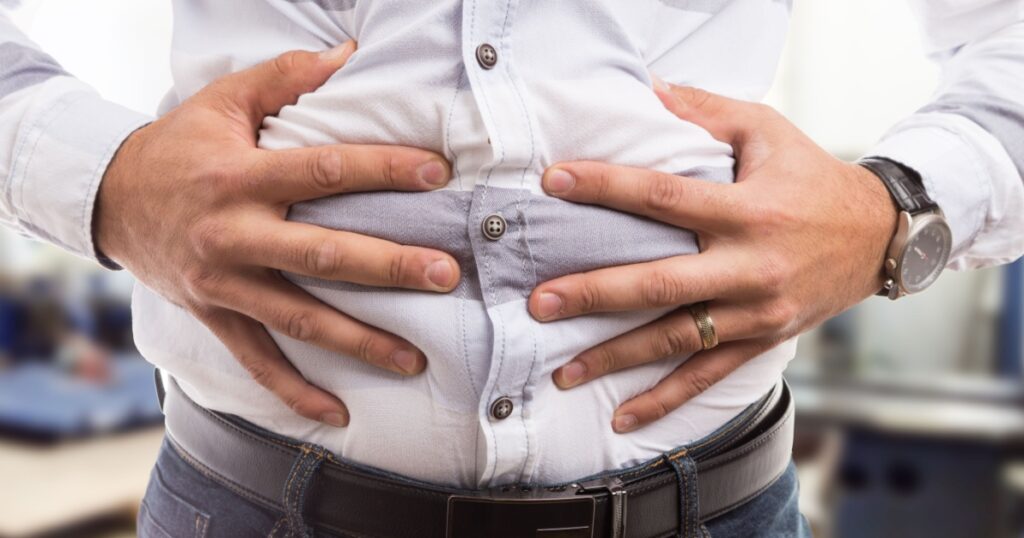
Start small. Simple changes in eating patterns like eating less rich or fatty foods and eating smaller portions more slowly can make a big difference. If the problem remains, consider assessing the state of your gut – do you really know if it’s healthy or not? You can replenish good bacteria with pro and prebiotics and do an at-home stomach acid test. As a rule of thumb, it always helps to visit your healthcare practitioner.
Read More: 10 Warning Signs Your Headache Could Be Dangerous
9. Hammer Toes
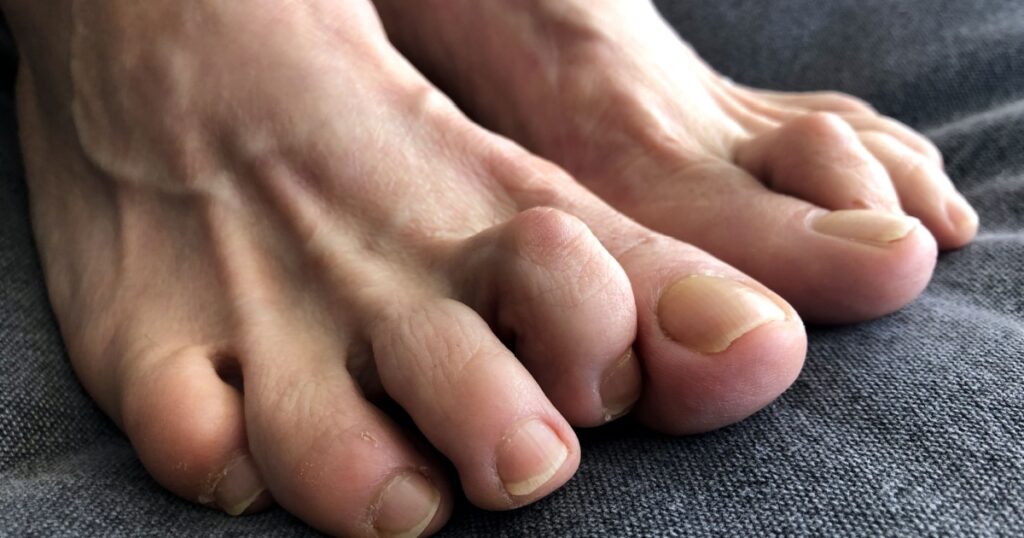
Having toes that always look curled might not seem like a big deal, but the condition known as hammer toes can cause complications such as an overcompensating gait that could lead to strain on your back, discomfort in your feet, and can be especially concerning for people with diabetes. [10]
Causes
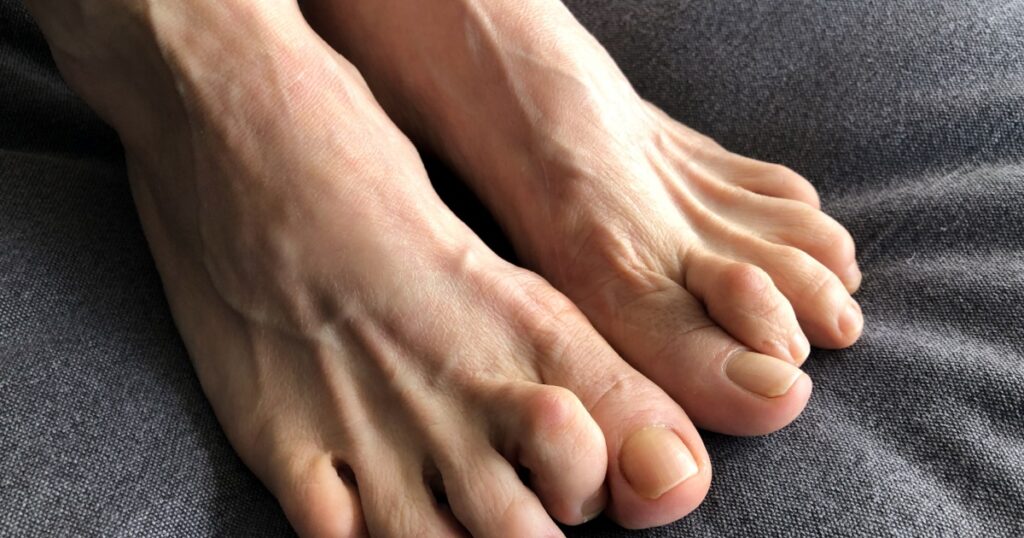
Hammer toes (where the toes are curled in and the “knuckle” is raised, often rubbing against shoes) is usually caused by poor footwear choices over a long period of time. However, hammer toes are also more common with people with flat feet. People with bunions or rheumatoid arthritis can also develop hammer toes.
Solutions
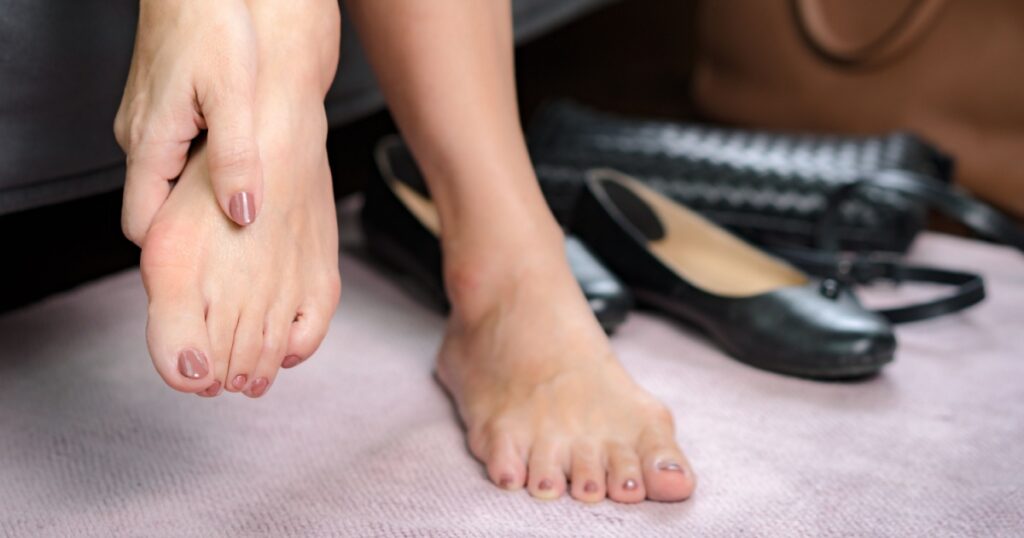
If you have flexible hammer toes (ie. you can bend your toes straight with your hands without pain), only minor treatments are necessary, starting with finding more appropriate footwear and applying ice packs. If you have rigid hammer toes (ie. is it painful to attempt to straighten them out), this means your misaligned tendons have impeded your joint mobility- usually surgery is necessary to reverse the problem. In either case, you should speak with your family doctor or a podiatrist to discuss most appropriate next steps. If you notice you have hammer toes, you should act sooner than later to reduce the risk of back problems, injury, and diabetic complications in the future.
Read More: Everything You Need to Know About Every Thyroid Disorder: Signs, Symptoms, Causes, Treatments
Sources
- [1] https://www.mayoclinic.org/diseases-conditions/muscle-cramp/symptoms-causes/dxc-20186052
- [4] https://www.webmd.com/migraines-headaches/guide/migraines-headaches-basics#1
- [6] https://dermatology.ca/public-patients/nails/brittle-nails/
- [7] https://www.webmd.com/beauty/hair-repair/answers-split-ends
- [8] https://www.mayoclinic.org/diseases-conditions/bad-breath/symptoms-causes/dxc-20192379
- [9] https://www.webmd.com/a-to-z-guides/features/bloated-bloating
